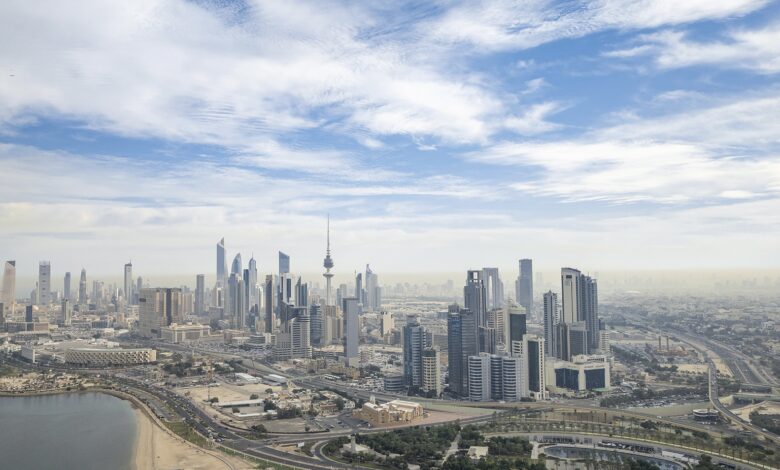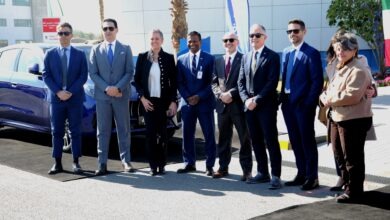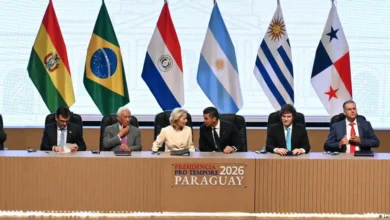Kuwait’s generous spending falls short of progress, reveals ESCWA
The nation spends more of its GDP than most GCC countries but lags in Sustainable Development Goals and HDI rankings, with 41 out of 184 countries globally (22%) achieving better HDI outcomes with lower spending.

• Kuwait’s public spending is 50% of GDP, far above the 37% global average, yet inefficiency persists with a 0.54 efficiency score versus the global 0.74.
• Economic and Social Commission for Western Asia (ESCWA) urges Kuwait to act swiftly on financial reforms, warning the window for action is closing, and calls for adopting its ten recommendations for a sustainable economy.
• ESCWA urged Kuwait to implement financial reforms, diversify its economy, support the private sector, adopt performance-based budgeting, and enhance transparency through digital platforms.
Amid ongoing directives from the Council of Ministers to reform the economy and accelerate infrastructure, housing, and development projects, the United Nations Economic and Social Commission for Western Asia (ESCWA) has urged Kuwait to take immediate and decisive action in managing public finances.
ESCWA warned that the window for implementing critical reforms is shrinking rapidly and emphasized the need for swift measures to address current challenges, ensure long-term fiscal stability, and adopt its ten recommendations aimed at steering Kuwait towards a more integrated, equitable, and sustainable economy, according to Al Jarida newspaper.
ESCWA stated in its report, “Social Spending, Spending Efficiency, and Financial Sustainability: Strategies to Rebalance Kuwait’s Budget,” released last week, that Kuwait is at a critical juncture in its economic trajectory. The country faces significant challenges in financial sustainability and the efficiency of social spending.
The report noted that public spending in Kuwait constitutes 50% of its gross domestic product (GDP), significantly higher than the global average of 37%. However, the management of this spending remains inefficient, with Kuwait scoring 0.54 on the efficiency index, compared to a global average of 0.74.
The report warned that the window for implementing essential reforms is rapidly narrowing. It highlighted that improving spending efficiency to meet the global average could result in financial savings of 6.8 billion dinars, equivalent to approximately 27% of the state’s public spending for 2023/2024.
ESCWA report highlights inequitable government transfers, calls for reallocation to support low-income families
The report identified issues in the equitable distribution of government transfers to individuals, noting that wealthier households currently benefit from 22% of total transfers due to the lack of effective targeting mechanisms. It recommended reallocating these transfers to middle- and low-income families, which would free up significant financial resources to be directed towards the most critical development sectors.
Economic diversification
ESCWA called for the implementation of broad financial reforms to bolster Kuwait’s economy, emphasizing economic diversification through the strengthening of non-oil sectors and support for the private sector. It also stressed the importance of enhancing mechanisms for collecting non-oil revenues, adopting performance-based budgeting, and utilizing digital platforms to improve transparency and efficiency.
Need to develop public services
The report underscored the need to develop public services, particularly by investing in preventive healthcare and modernizing medical infrastructure. It also recommended improving education through teacher training, curriculum development, and expanding research initiatives to support long-term economic and social goals.
ESCWA urges Kuwait to align financial strategy with SDGs for long-term stability and global growth
Finally, ESCWA emphasized aligning Kuwait’s financial strategy with the United Nations Sustainable Development Goals (SDGs) to achieve long-term economic stability. Implementing these reforms could enhance Kuwait’s rankings in global indices, such as the Human Development Index and the SDG Index, positioning the country to better achieve its economic and developmental aspirations.
The ESCWA report outlined ten recommendations to safeguard Kuwait’s financial integrity and maintain social benefits, emphasizing that immediate strategic measures can achieve long-term prosperity and preserve social welfare for future generations.
The report stated that “The Kuwaiti economy, which relies heavily on natural resources, faces persistent challenges in financial sustainability and economic diversification. While it experienced a recovery after the COVID-19 pandemic, it remains vulnerable to global shocks and fluctuations in oil prices due to the slow pace of diversification, the low contribution of non-oil revenues to non-oil GDP, and its heavy reliance on oil revenues.”
Urgent need for structural reforms
ESCWA highlighted that Kuwait’s GDP growth depends predominantly on oil revenues, which accounted for 91% of government revenues in 2023. Fluctuations in oil prices have significantly impacted public financial balances, leading to a deficit in most years since 2015.
Non-oil GDP grew by 47% over the past decade, but non-oil revenues contributed only 8% to non-oil GDP in 2023. This reliance on oil revenues has left Kuwait’s economy exposed to external shocks, underscoring the urgent need for structural reforms to diversify revenue sources and stabilize public finances.
The report noted that fiscal stability has historically been tied to oil price fluctuations. For instance, during periods of high oil prices, such as in 2011, public finance balances recorded a surplus of 31% of GDP. Conversely, during recessions like the COVID-19 pandemic in 2020, the deficit worsened to 31.6% of GDP. ESCWA emphasized the need for a sustainable financial framework to mitigate such risks and achieve long-term economic stability.
Substantial waste of public resources
The report pointed out that Kuwait has generous public spending but ranks lower in efficiency compared to many countries. Globally, better public spending efficiency correlates with higher Sustainable Development Goals (SDG) Index scores. Kuwait’s efficiency score for public spending is 0.54 (on a scale of 0 to 1), below the global average of 0.74 and significantly lower than the 0.85 average for high-income countries. This inefficiency represents a substantial waste of public resources.
Improving efficiency to reach the global average could save approximately 6.8 billion dinars—27% of the public spending budget for 2023/2024. These savings could be redirected to critical sectors such as education, healthcare, and infrastructure to support sustainable development.
Challenges in achieving SDGs
According to the report, Kuwait’s public spending is among the least effective in achieving the SDGs compared to other GCC countries. Despite spending a higher percentage of GDP than most GCC nations, Kuwait achieves lower scores on indices like the Human Development Index (HDI) compared to Qatar and the UAE. Globally, 22% of countries (41 out of 184) have achieved better HDI results with lower spending than Kuwait, revealing inefficiencies in resource allocation.
The report also noted that Kuwait scored 0.432 on ESCWA’s Development Challenges Index, exceeding the global average of 0.425 but falling short compared to the high-income countries’ average of 0.277. This high score reflects the country’s significant development challenges, particularly in human development, environmental sustainability, and governance. ESCWA recommended monitoring and assessing the quality of public and social spending to ensure inclusive and sustainable development.
Social spending hits 9.84 billion dinars
The report indicated that general social spending in Kuwait totaled approximately 9.84 billion dinars in 2022/2023, accounting for 44% of the general budget, a figure consistent with the 2018/2019 period. However, real per capita social spending has decreased by 12% since 2018/2019.
To address these challenges, ESCWA urged Kuwait to diversify its national economy by strengthening the private sector, improving non-oil revenue collection, and adopting performance-based budgets and digital platforms to enhance transparency and efficiency.
Aligning spending with UN’s SDGs
The report stressed the importance of aligning public spending with national priorities and SDGs. Investments in education, healthcare, and infrastructure must be prioritized, along with efforts to modernize and improve preventive healthcare systems and educational initiatives. Aligning Kuwait’s financial strategy with global SDG frameworks would enhance the country’s rankings in global development indices and ensure long-term stability and growth.
The report stated that “a significant portion of the budget is allocated to subsidy programs, particularly in the energy sector. However, high-income groups disproportionately benefit from this broad-based support, making these measures inequitable. While some reforms have been implemented to rationalize fuel subsidies, gaps still remain.”
Kuwait allocates 12% of its budget to education
The report noted that Kuwait allocates 12% of its budget to education, exceeding the global average. However, it emphasized that education in the country lags behind international standards despite the substantial expenditure over the years.
It stated that “Recent results from international assessments in mathematics and science show that Kuwaiti students scored 383, significantly below the global average of 449. This highlights the urgent need to improve the quality of education.
Currently, spending in the education sector is primarily focused on operational costs, such as salaries and utilities, with minimal investment in research and the modernization of digital curricula and tools. Addressing these gaps is crucial to building a skilled workforce capable of driving economic diversification efforts.”
Generosity in allowances and weak targeting mechanisms
The ESCWA report highlighted Kuwait’s generosity in providing comprehensive public transfers to citizens, including marriage and housing allowances, as well as medical treatment abroad. However, household surveys reveal significant shortcomings in the targeting mechanisms of these transfers, leading to wasted public funds.
The report pointed out that approximately 22% of government transfers go to the wealthiest 20% of households, with an average household income exceeding 6,000 dinars.
The report stressed that rationalizing these transfers and prioritizing middle- and low-income households would save substantial resources, enhance equity, and improve financial efficiency.
Improving spending efficiency could save 27% of public spending
“Kuwait needs immediate action to implement targeted financial reforms. This is not an option but a necessity to safeguard the economy and ensure the welfare of its citizens,” said the report’s author, Nerangan Saranji.
ESCWA, one of the five United Nations regional commissions, supports inclusive and sustainable economic and social development in Arab countries and promotes regional integration.
A quarter of Kuwait’s population has diabetes
The report highlighted that Kuwait’s spending on the health sector aligns with international standards, comprising 11–12% of the budget and primarily funding services provided to patients in health facilities.
However, Kuwait has alarmingly high rates of non-communicable diseases, including diabetes, which affects a quarter of the population. This is exacerbated by unhealthy diets, sedentary lifestyles, and pollution, contributing to an overall decline in public health.
The report attributed these shortcomings to the health sector’s focus on curative care rather than preventive measures, emphasizing the need for a shift in priorities to improve health outcomes.




























